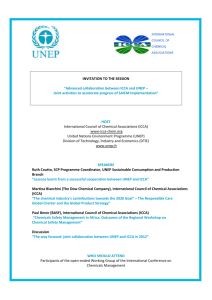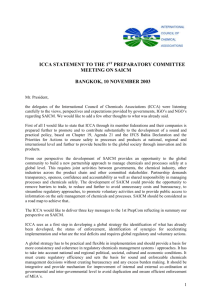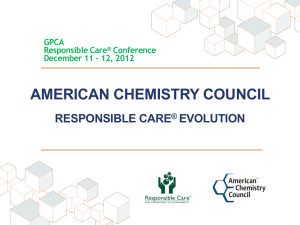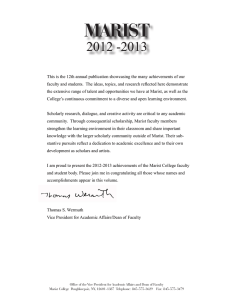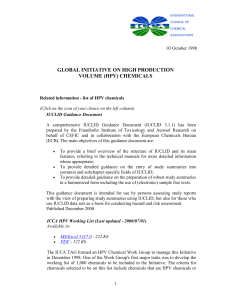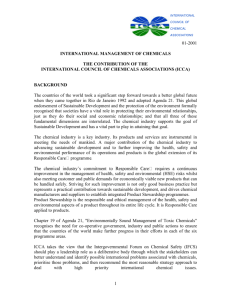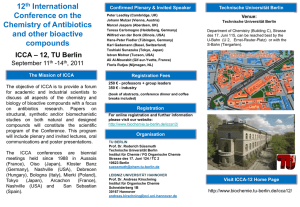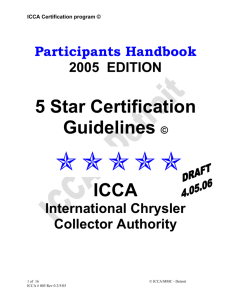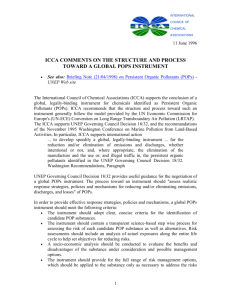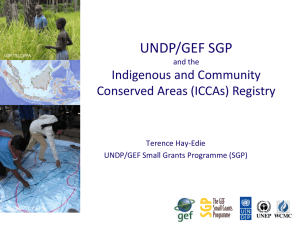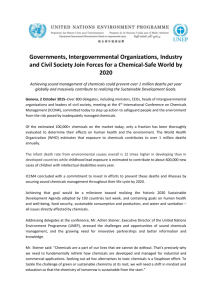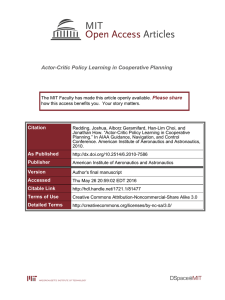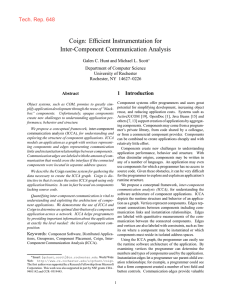Policy paper on Principles for Risk Based Decision Making
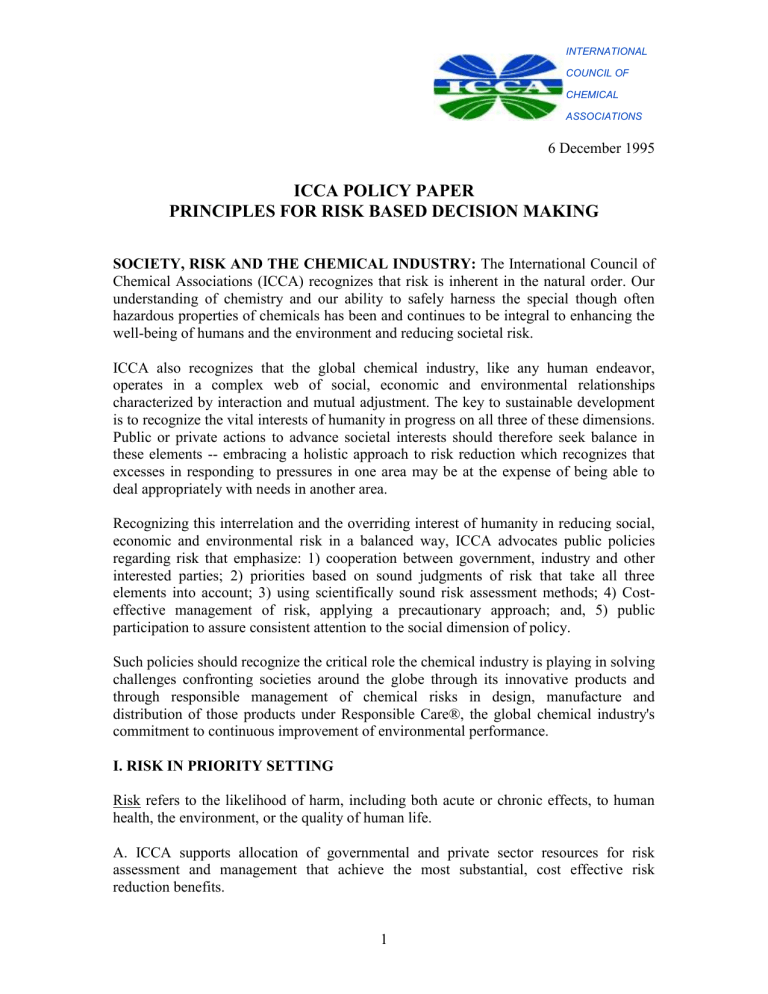
INTERNATIONAL
COUNCIL OF
CHEMICAL
ASSOCIATIONS
6 December 1995
ICCA POLICY PAPER
PRINCIPLES FOR RISK BASED DECISION MAKING
SOCIETY, RISK AND THE CHEMICAL INDUSTRY: The International Council of
Chemical Associations (ICCA) recognizes that risk is inherent in the natural order. Our understanding of chemistry and our ability to safely harness the special though often hazardous properties of chemicals has been and continues to be integral to enhancing the well-being of humans and the environment and reducing societal risk.
ICCA also recognizes that the global chemical industry, like any human endeavor, operates in a complex web of social, economic and environmental relationships characterized by interaction and mutual adjustment. The key to sustainable development is to recognize the vital interests of humanity in progress on all three of these dimensions.
Public or private actions to advance societal interests should therefore seek balance in these elements -- embracing a holistic approach to risk reduction which recognizes that excesses in responding to pressures in one area may be at the expense of being able to deal appropriately with needs in another area.
Recognizing this interrelation and the overriding interest of humanity in reducing social, economic and environmental risk in a balanced way, ICCA advocates public policies regarding risk that emphasize: 1) cooperation between government, industry and other interested parties; 2) priorities based on sound judgments of risk that take all three elements into account; 3) using scientifically sound risk assessment methods; 4) Costeffective management of risk, applying a precautionary approach; and, 5) public participation to assure consistent attention to the social dimension of policy.
Such policies should recognize the critical role the chemical industry is playing in solving challenges confronting societies around the globe through its innovative products and through responsible management of chemical risks in design, manufacture and distribution of those products under Responsible Care®, the global chemical industry's commitment to continuous improvement of environmental performance.
I. RISK IN PRIORITY SETTING
Risk refers to the likelihood of harm, including both acute or chronic effects, to human health, the environment, or the quality of human life.
A. ICCA supports allocation of governmental and private sector resources for risk assessment and management that achieve the most substantial, cost effective risk reduction benefits.
1
B. ICCA supports use of scientifically valid risk assessment methods for evaluating and prioritizing health, safety and environmental risks, recognizing that the scope and complexity of such efforts should vary with the significance of the problems being addressed. New concepts in this field, like comparative risk ranking and relative risk, should be further developed as tools to improve the effectiveness of risk methodology and to assist in priority setting.
C. ICCA supports cooperative international governmental and private sector development of information needed for countries to set health, safety, and environmental risk reduction priorities and to assess the cost-effectiveness of alternative measures.
II. RISK ASSESSMENT
Risk Assessment refers to the process by which the form, dimension, and characteristics of a risk are estimated. Risk assessment encompasses the array of qualitative and quantitative tools available for estimating risk.
A. ICCA supports cooperative international efforts involving both government and the private sector, to develop scientific data to improve the accuracy and relevance of risk assessments and to harmonize methodology and quality assurance. ICCA supports:
use of all valid scientific data regarding human health, hazard and exposure, including long term fate of our products, in conducting risk assessments;
transparency in the review and utilization of data, in model selection and documentation of assumptions;
adoption of reasonable safety factors according to good scientific practice; and
broad use of scientific peer review.
B. Precise numerical risk levels often imply an exactness that goes beyond the accuracy of most risk assessments. ICCA supports the use of narrative descriptions of risk that incorporate ranges or distributions of risk values to recognize the assumptions and safety factors used. Communication of risk plays an indispensable role in achieving acceptance.
Risk-models which cannot be communicated have an inherent limitation in that regard.
III. RISK MANAGEMENT
Risk Management refers to the process by which risk is controlled and/or reduced.
A. ICCA supports a holistic approach to risk management which takes into explicit account the full range of potential impacts of proposed policies on societal well being, including environmental, economic and social impacts.
B. ICCA supports Principle #15 of the Rio Declaration 1 A science-based, precautionary approach to risk management is fundamental to our health, safety and environmental protection efforts, and should guide application of this Principle. This includes cost effective measures to prevent health and environmental degradation where the weight of
2
plausible scientific evidence establishes that serious or irreversible damage to health or the environment is likely to be caused by the activity or product in question.
C. ICCA, through Responsible Care®, encourages companies to work toward characterizing products with respect to their hazards and their risks and, in concert with their customers, take appropriate risk reduction actions. This includes limitations on use or even phasing-out of specific uses of particular chemicals where unacceptable risks are not otherwise manageable. For example, where substitution of one activity or product by another is considered, the substitute should have a comparable function or effectiveness; risk assessment and risk benefit analyses should be performed and compared for both the original activity or product and the alternative proposed; the economic impact should be proportionate to the environmental benefit; and the substitute should not cause an equal or more burdensome effect on health, safety and the environment.
This approach is consistent with the risk management prescriptions of Chapter 19 of
Agenda 21 , which recognizes that a broad range of risk management options for chemicals are required and appropriate and recognizes the need to consider potential risks associated with alternatives. It is also consistent with the position of the
Intergovernmental Forum on Chemical Safety (IFCS), which cited "chemicals for which high and unmanageable risks are associated" as the targets for priority attention in finding and introducing safe substitutes, in implementing Chapter 192 "Priorities for Action" approved at formative meeting of IFCS, April, 1994, Stockholm, Sweden.
D. ICCA supports and encourages technological innovation to reduce risks to human health and the environment from chemical manufacture, use and disposal.
E. ICCA supports setting risk management priorities and establishing risk reduction activities at the national or supra-national level to address public health, safety and environmental risks. Risk management activities at the regional or global level should be exceptional, limited to:
risk assessment and management of trans-boundary pollution problems;
consolidation of data generation, gathering and evaluation where there is significant overlap in national or regional priorities for the assessment of specific
chemicals or circumstances; and assessment of risks having priority for developing countries but beyond their technical capacity to evaluate.
IV. RISK COMMUNICATION
Risk Communication refers to the process by which government agencies, the business, environmental, and scientific communities, the media, and the public discuss risk with each other.
A. ICCA supports input by all interested parties in the prioritization, risk assessment and risk management processes.
3
B. ICCA supports clear and open communication by policy makers of the results of comparative risk rankings, priorities and uncertainties, and the cost and benefits of risk management and risk reduction actions.
C. ICCA supports informed education and communication programs to enhance understanding among all interested parties of the risks and benefits of chemicals.
_______________________________________
Back?
Rio Declaration Principle #15 states: In order to protect the environment, the precautionary approach shall be widely applied by States according to their capabilities.
Where there are threats of serious or irreversible damage, lack of full scientific certainty shall not be used as a reason for postponing cost-effective measures to prevent environmental degradation.
4
